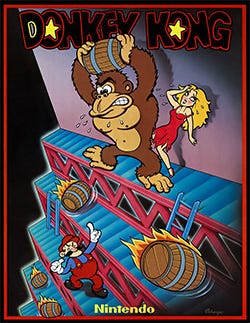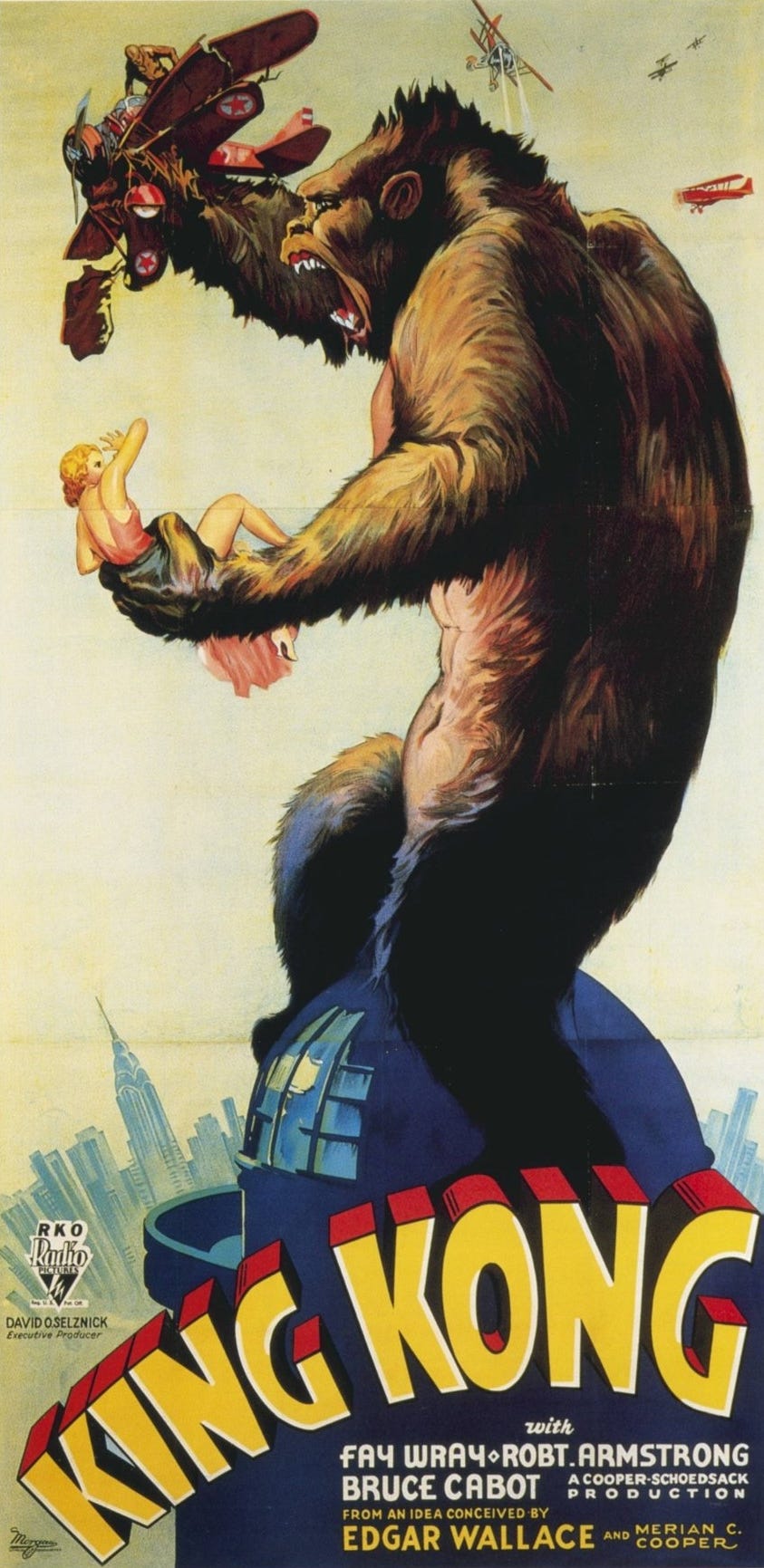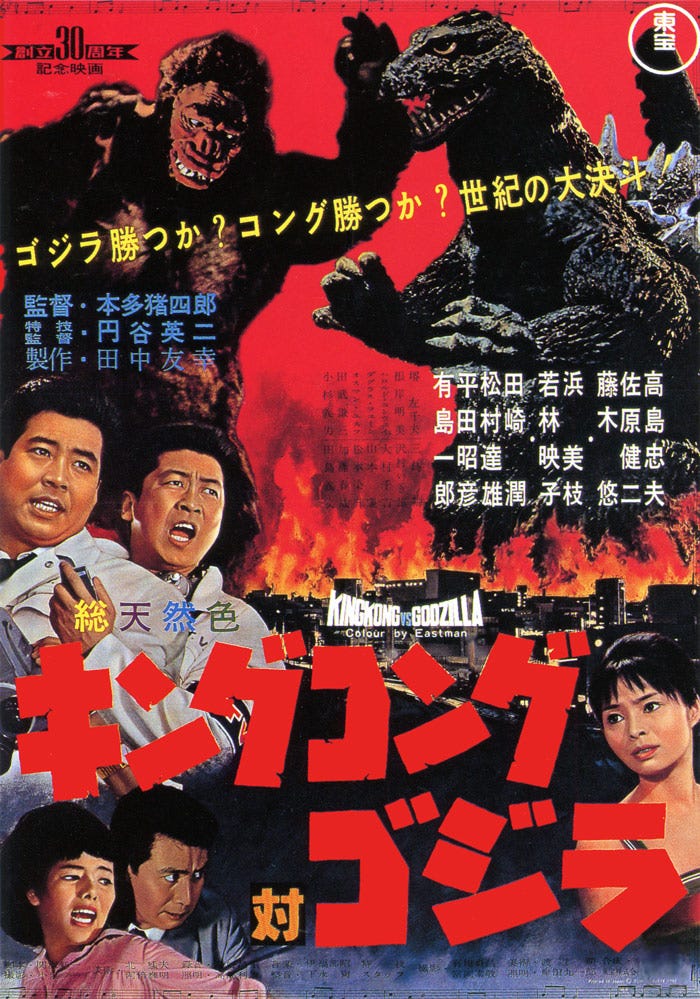King Kong: How a Lizard Created a Monster
How the discovery of Komodo dragons led to Hollywood's most famous ape—and decades of bizarre copyright battles
The morning mist wrapped everything like a wet cloth when Dutch Lieutenant van Steyn van Hensbroek stepped onto the shores of Indonesia's Komodo Island. It was 1910, and the Dutch East India Company, originally arrived for spices in the 17th century, now controlled much of Indonesia's governance.
Van Steyn had heard the stories for months. Local fishermen spoke of "Buaya Darat"—The land crocodiles, on islands they avoided after dark. Curiosity burned in Van Steyn’s his chest.
He pushed through dense jungle, branches whipping across his face. The forest air was humid and heavy. Towering trees groaned against each other in the wind.
Then he encountered it.
A ten-foot-long, saw-toothed lizard emerged from a bush. The creature's forked tongue flicked out, tasting the air. Van Steyn's spine turned to ice. The world had never known such a creature existed.
News of the Komodo dragon exploded across newspapers worldwide.
The Birth of a Monster
Merian Cooper, a Hollywood director, was captivated by the discovery. His appetite for adventure stories had found its perfect meal.
When Cooper's friend, adventurer William Douglas Burden, announced his plan to hunt Komodo dragons in 1926, Cooper listened intently. Burden returned with two live specimens for the Bronx Zoo, where crowds pressed against barriers to glimpse these prehistoric survivors.
But it was Burden's stories, not the dragons themselves that ignited Cooper's imagination. Tales of an island shaped like a skull, of dangers lurking in the jungle, of bringing a monster back to civilization. These seeds grew in Cooper's mind into something magnificent: a giant ape discovered on a remote island and dragged to New York City.
King Kong was born from the collision of a real dragon and a dreamer's ambition.
The Strategic Novel
Cooper was shrewd. Before filming began, he had writer friend Delos W. Lovelace transform his screenplay into a novel, published a year before the movie's release. This wasn't just merchandising. It was building hunger.
The gambit worked. When "King Kong" hit theaters in 1933, it conquered. The image of Kong atop the Empire Building became iconic.
Cooper had been obsessed with gorillas since age six. Once, while filming in Africa, encountering baboons gave him the idea for an ape protagonist. The name came to him like a drumbeat: "Kong... there was something mysterious about it."
King Kong vs. Godzilla: The Shock
Cooper believed his rights to King Kong belonged to him alone.
Then came that morning in 1962.
Cooper's coffee froze halfway to his lips. There in the newspaper was an advertisement: "King Kong vs. Godzilla." His Kong. Fighting a Japanese monster. Without his permission.
With trembling fingers, he called his lawyer.
Investigation revealed that RKO Pictures, the studio that produced his original film, had sold King Kong's rights to Japan's Toho Studios behind his back. They'd also been selling comics and merchandise, profiting from Cooper's creation.
Cooper's original contract with RKO was clear: he would direct for a salary but retain character rights. RKO couldn't sell Kong without his permission. They had anyway.
Cooper sued, but victory eluded him. During his service as a World War II pilot, crucial documents had vanished—including papers that proved Kong belonged to him.
The Remake Wars: 1975
By 1975, Hollywood had transformed, but King Kong's power remained unchanged. Italian producer Dino De Laurentiis decided a Kong remake would print money. He paid RKO handsomely for remake rights.
Universal Studios, having lost the bidding, responded with an absurd claim: they'd been "verbally promised" the rights.
Then Universal's lawyers discovered something everyone had forgotten: Delos Lovelace's novel. The copyright had expired. No one had renewed it. The novel had slipped into public domain.
Universal announced they would produce "The Legend of King Kong" based on this public domain novel. They even began pre-production, pressuring De Laurentiis.
In 1976, an out-of-court settlement ended the fight. Universal shelved their production. De Laurentiis released his remake successfully.
The Son Fights Back
Cooper died in 1973. His son Richard inherited the fight.
Richard Cooper went to court with fresh lawyers and old grievances. The verdict finally came:
Cooper's contract with RKO covered only the original "King Kong" and "Son of Kong." Every subsequent deal RKO made was unauthorized. Those profits belonged to Cooper's heirs.
The novel remained in public domain. But the character of King Kong? That belonged to the Coopers.
Richard sold these rights to Universal Studios.
Donkey Kong: When Nintendo Met Kong
Arcade games were conquering the world quarter by quarter. In a Seattle bar, players pumped coins into a machine where a carpenter named Jumpman (later Mario) rescued his girlfriend from an ape.
The game was Donkey Kong. Universal smelled opportunity.
Fresh from purchasing Cooper's rights, Universal sued Nintendo for trademark infringement. Nintendo hired John Kirby, whose strategy was devastating.
Kirby excavated Universal's own arguments from 1976 — where Universal had claimed King Kong was public domain. He presented these arguments back to Universal like a mirror.
The judge didn't just rule against Universal; he excoriated them for hypocrisy. The court also noted that "Donkey Kong" and "King Kong" were entirely different names.
Nintendo's victory was so complete, they celebrated magnificently. They gifted John Kirby a $30,000 sailboat named "Donkey Kong." They also named a pink, spherical video game character after him—Kirby—who would star in dozens of games, immortalizing the lawyer who saved their empire.

Who Owns King Kong Today?
Today, King Kong's rights are scattered across Hollywood:
Universal Studios operates King Kong theme park attractions with rights obtained from Richard Cooper.
Cooper's heirs retain certain publishing rights for King Kong books and comics.
Warner Bros, through corporate acquisitions, controls the original RKO film rights.
What exactly Universal bought remains sealed in contracts.
The great irony? A character born from one man's vision has become a fractured legal entity. King Kong's copyright has been torn apart and distributed across Hollywood—as if the great ape himself had grabbed it in both hands and ripped it to pieces in his final rage.
What started as a Dutch officer stumbling upon a real monster in an Indonesian jungle became one of cinema's most enduring myths—and copyright law's most magnificent mess.




